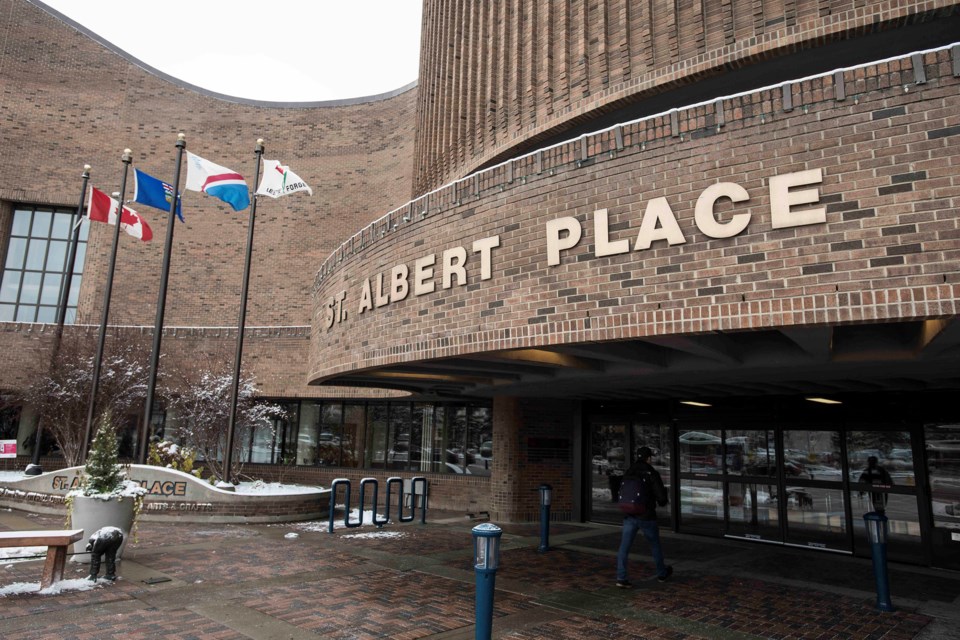St. Albert city council is looking at ways of reducing financial stress for residents and business owners amid the COVID-19 pandemic.
One of those plans is to cut down a proposed increase in municipal property tax for 2021. On Nov. 2, administration presented city council with a $112.4-million budget featuring a tax increase of 1.1 per cent (or about $40 a year more for the average homeowner). Councillors will begin voting on motions to change the budget on Nov. 24, Dec. 1 and Dec. 3. The budget will then go for final approval on Dec. 21.
To realize a zero-per-cent tax increase, the city would need to decrease the operating budget by $1.2 million. This could be done through any combination of decreased expenses, likely with impacts on service levels, or increased revenues.
Mayor Cathy Heron put forward a series of motions related to cutting city expenses next year, including a $300,000 cut to the Family and Community Support Services (FCSS) grant funding and a $220,000 reduction into the city’s public art reserve. If approved, savings from all these motions would reduce the city’s operating budget by $726,409.
According to a recent city survey, 39 per cent of respondents said they weren’t willing to accept a tax increase in next year’s budget. With these cuts, Heron said she believes council will be able to further reduce the proposed tax increase.
"I do think the zero per cent is achievable," Heron said. "We're doing things that are pushing the edge of policy because we recognize that this year is different ... we need to help our residents and businesses."
The city is expecting to see a $2.6-million surplus at the end of the year, said Kevin Scoble, chief administrative officer, though administration is recommending not to allocate the surplus for the 2021 budget. Diane McMordie, director of finance, said the intent is to move the surplus into the city's stabilization reserve to cover future challenges brought on by the COVID-19 pandemic.
Coun. Wes Brodhead said he is supportive of cost-cutting motions and expects the approved tax increase will come in lower than 1.1 per cent. He commended administration for bringing forward a 1.1-per-cent tax increase “right out of the gate,” and expects more cost-saving measures will be found through Ernst & Young’s fiscal and operational review.
“I think the priority for council for sure is to minimize the ask of the municipality, but balance that with what the needs of the municipality are. And 1.1 is not an egregious thing, but in terms of COVID, I would personally like to see it come down a little bit,” he said.
Coun. Natalie Joly said the proposed budget is a “good start” for council to work with over the next few weeks, as they deliberate whether to reduce the budget further or add to it to balance the needs of the community.
Coun. Jacquie Hansen said she thought the 1.1-per-cent increase was “the best-case scenario,” unless council decides to reduce service levels further. No tax increases this year could have ripple effects on future budgets.
“It's not really sustainable – actually, a zero-per-cent increase is really a cost, because there's a lot of costs that go up in services and if we can't have the revenue coming in, that actually becomes a liability,” Hansen said. Attracting more investment to St. Albert and coming up with new revenue streams will be important in the years to come, she said.
“Unless we can really shift the corporate tax rate quickly, maybe (operate with) really reduced services, I can't see years and years of zeros. At some point in time, we have to look after our infrastructure, and that costs money.”
Coun. Ken MacKay said the proposed budget presents a “good platform” for council to work with. He said he will be looking for more opportunities to reduce the tax impact on residents and local business community, but without creating “unintended consequences.”
“I'm headed to go as low as I possibly can without major service level adjustments and impacts. So I think we can get to zero, but what does that mean?” MacKay said. Further cutbacks could create hardships for the city’s vulnerable populations, he said, or lead to significant service level reductions like closing Grosvenor Pool.
“I would love to see us get down as low as we possibly can go without having a severe impact on the residents and business communities.”
Coun. Sheena Hughes said the proposed budget is a good start, and believes a zero-per-cent tax increase is "very achievable." No increase to taxes this year doesn't mean an increase in property taxes in subsequent years, she said, because it all depends on which projects the city decides to prioritize in the future.
Hughes said she is considering bringing forward a motion to freeze the city's electrical franchise fee next year, which is set to go up to 10 per cent on Jan. 1. While that fee does help offset property taxes, she said it's still money paid for by residents, community groups and businesses each month.
"Electrical franchise fees tend to hit harder on businesses and larger organizations, whether they're community groups or businesses," Hughes said. "With businesses struggling this year and next year, additional hits on the electrical franchise fee could be a serious concern."
Coun. Ray Watkins said residents who participated in world café discussions over the last month regarding the budget made it clear they wanted council to look at cutting back on discretionary spending to avoid a tax increase.
"Times are tough in Alberta. With the price of oil and now the second wave of COVID, people are just trying to stay above water," Watkins said. "I'm going to do everything I can to not increase taxes next year, but it's a juggling act between costs and services."




